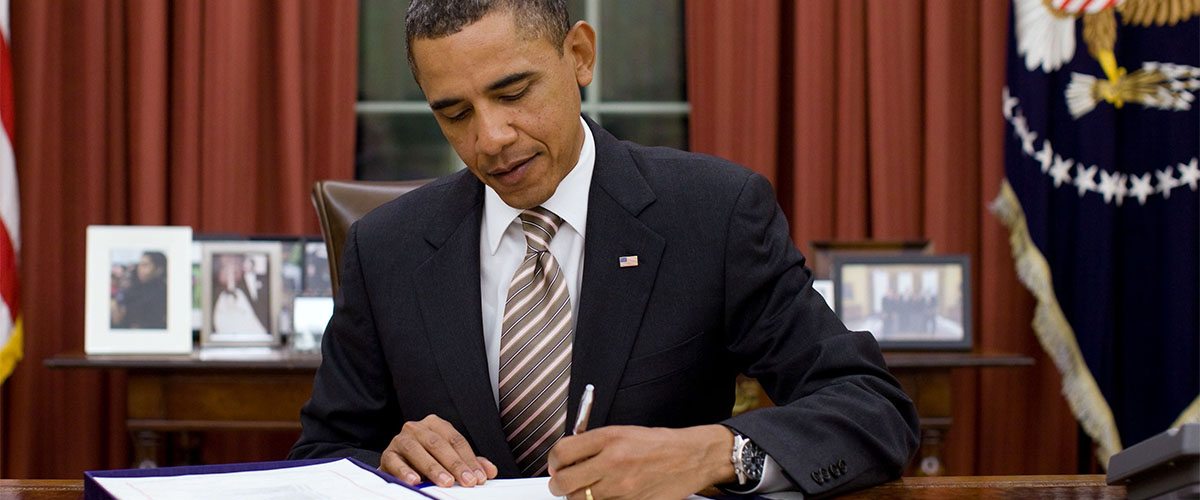A bipartisan group of 27 lawmakers have sent President Obama a letter urging him to end the current barriers to cannabis research.
The lawmakers include vocal cannabis advocates, like Earl Blumenauer, D-Ore., Kirsten Gillibrand, D-N.Y., Rand Paul, R-Ky., Cory Booker, D-N.J., and Barbara Boxer, D-Calif., all of whom have supported some form of marijuana or hemp reform in the past.
In their letter, the lawmakers, including a mix of senators and representatives from both sides of the aisle, urged Obama to listen to public sentiment on cannabis legalization, especially for medical purposes.
“We have heard from numerous patients across the country and parents whose children have treatment-resistant conditions about the benefits they have experienced from using cannabis to treat serious illnesses”, the lawmakers say in their letter.
The most eminent of these illnesses has been childhood epilepsy, which has stood as a rallying point for the medical marijuana movement. As part of this, Medical Marijuana, Inc. has partnered with families in the U.S. and abroad with the goal of expanding awareness, promoting research, and changing local laws to increase access to medical marijuana for the seriously ill.
The letter to President Obama goes on to say, “Many prominent physicians and physician groups, including the American Medical Association, the American College of Physicians, the American Academy of Neurology, and the American Academy of Family Physicians, have joined patients and families in calling for more research about the use of medical cannabis.”
This comes as medical marijuana enjoys higher than ever support among citizens in the U.S. Over 80% of Americans support medical marijuana, and just last week, the not-for-profit Doctors for Cannabis Regulation formed to act as a guiding voice for physicians regarding marijuana reform.
“Twenty-three states have passed laws establishing medical cannabis programs and an additional seventeen have passed laws regarding the medical use of cannabidiol (CBD), a compound derived from cannabis”, yet only two researchers in the U.S. in 2015 received shipments of DEA approved cannabis for use in human trials, according to the letter, due in large part to stringent regulations set forth in the DEA’s approval process.
In March of this year, Kannalife™ Sciences received rare DEA approval to import pharmaceutical grade CBD for its ongoing research cannabinoids as a therapeutic agent for the treatment of a pair a neurological diseases, hepatic encephalopathy (HE) and chronic traumatic encephalopathy (CTE). These feasibility studies will pave the way to clinical trials for cannabinoid-based drugs in the future. The strict set of regulations and the lengthy, often invasive, application process for cannabis research has dissuaded many qualified researchers from even considering cannabis research.
Another barrier faced by researchers is the University of Mississippi’s monopoly on cultivation currently allowed by the National Institute on Drug Abuse. While the DEA claims the single source of research cannabis is necessary due to the UN’s Single Convention on Narcotic Drugs, NIDA Director Dr. Nora Volkow testified before Congress that there is “no scientific reason” for the monopoly, that it “is not something NIDA chose to do,” and that without it, “efficiency, effectiveness, availability for research would be better”, according the letter.
The lawmakers continue that “DEA-licensed researchers have told us that this monopoly is the most significant barrier to research, because the NIDA drug supply program is inadequate to conduct the basic research that physicians and patients need”.
Researchers have also complained about the quality of the research cannabis being produced by the facility at Ole’ Miss, which is often much lower in both THC and CBD than cannabis available in the legal medical and recreational markets. This low cannabinoid concentration makes it difficult for researchers to provide clinical trials in real world conditions.
The authors of the letter were encouraged by the recent announcement by the DEA to consider rescheduling marijuana out of Schedule I, reserved for dangerous drugs with no medical uses, but make it clear that the problem goes beyond a simple reclassification of marijuana.
“Despite these developments, researchers, doctors, and patients in these forty states are still subject to federal barriers impeding innovation and medical research,” the lawmakers say in the letter. “Until we have comprehensive scientific research on the medical risks and benefits of cannabis and its derivatives, we will continue to debate this issue on the basis of outdated ideology instead of modern science.”
The lawmakers assert that, until the DEA ends the NIDA single producer stipulation and allows additional researchers access to obtain cannabis, research into the medical uses of marijuana will continue to be stymied.
Medical Marijuana, Inc. cheers this push by America’s elected officials to bring cannabis research to the forefront of our changing national climate on marijuana reform. With over 23,000 published studies on the effects of cannabis and cannabinoids, we see great potential in developing the medicinal purposes of this amazing plant.
“Barriers to legalization are falling around the world, and it is great to see the USA being more progressive toward this natural plant and its extracts,” Dr. Stuart Titus, CEO of Medical Marijuana, Inc., recently remarked. He further revealed that Medical Marijuana, Inc. “has significant research projects on the whiteboard awaiting an easing of restrictions.”






